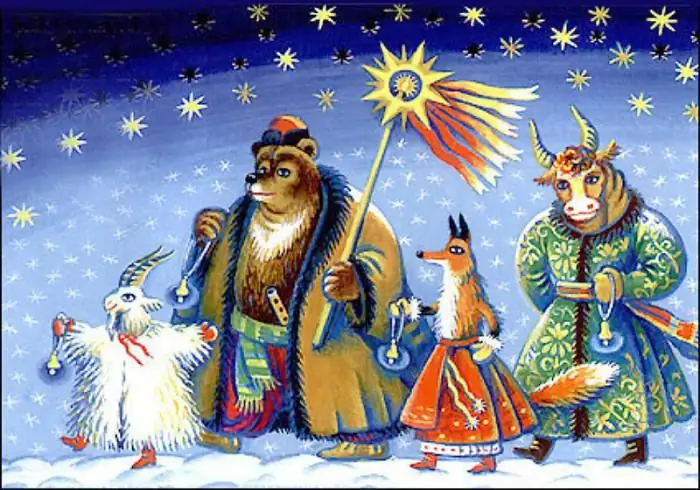2026 Author: Priscilla Miln | miln@babymagazinclub.com. Last modified: 2025-01-22 17:55:29
What dates our history does not contain! The Old New Year holiday is not in any calendar of the world, but for almost a century it has been celebrated in our country and in some states of near and far abroad. Almost two weeks after the first of January, the fun at the Christmas tree is back. The current dual tradition is very surprising to foreigners, and not all of our compatriots know why this is happening. Where did the custom of celebrating the Old New Year come from? What date is it marked? Let's figure out in our article all the mysteries of the appearance of this amazing holiday.
Change of chronology
Until the beginning of the twentieth century, the Julian calendar operated in Russia. Back in the sixteenth century, astronomers recognized it as erroneous, and the countries of Europe began to live according to the Gregorian, introduced by Gregory XIII. The thing is that the year has a differentaverage duration, and therefore a difference in dates gradually arose.

By 1917 in Russia and Europe there was a discrepancy of as much as thirteen days. Having come to power, the Bolsheviks carried out numerous changes and reforms, including the issue of bringing time into one format with the European one. The decree issued by Vladimir Lenin in 1918 on the transition of Russia to the Gregorian calendar eliminated confusion in numbers, and the whole world began to live according to one calendar.
This is the history of the holiday. Old New Year, as we see, arose due to a change in the calendar. Instead of moving the event from one date to another, in the current historical situation, there is another reason for celebration. Now we have two opportunities to meet the coming year, you can do it in the old and new style.
The origins are in church traditions
The Julian calendar has been preserved in the Russian Orthodox Church, which to this day calculates all Christian holidays only according to it. Keeping the traditional time, the so-called "old style", the Russian Church rejects the European chronology. Since the worldly new year falls on January 14, the Old New Year can be called the New Year in the old style. This day before the revolution was considered the first day of January. Historically, our ancestors, having switched to a new calendar, did not depart from the previous one. This is the secret of the two New Year holidays in our country and some neighboring countries.
Is it possible to have a feast duringpost?
For Orthodox people, the current January 1 falls on the time of the strict Christmas fast. During this period, believers refuse meat, fast food and entertainment. These bans end only on the 7th, so on January 14, the Old New Year becomes a truly special day when you can enjoy life and enjoy the holiday. In European countries, Catholic Christmas is celebrated on December 25, so the New Year's table can be safely set with any dishes.

Second Chance, or To Be Continued…
Surprisingly, since 1918, traditionally and annually, people celebrate the Old New Year. What date to celebrate this holiday, today even children know.
What is the secret of the popularity of the holiday, it is definitely difficult to answer. For some, this is the Orthodox New Year, for others it is an occasion to gather the whole family at the table, for others it is an opportunity to complete what they did not have time to do before January 1.
The pre-New Year fuss and hype subsided, there is no more running around the shops in search of gifts and products, and a person has a unique chance to prolong the charm of the holiday. If you met the chiming clock on December 31 with your family, then this time you can have a party with friends, or vice versa. If, when setting the table at the end of last year, you prepared a traditional Olivier salad and herring under a fur coat, then on this day you can experiment with new dishes.
What to do on Old New Year?
It's no secret that TV has firmly entered our lives. TV programs, programs and films are watched by the whole country. Prepared especially for New Year's Eve, some shows may be of interest. If you missed a holiday movie or program last time because of a trip to the Christmas tree or a noisy feast, then you should not be upset: television people, perfectly understanding this moment, usually repeat their program on the evening of January 13. Each family can come up with their own traditions for celebrating the Old New Year.

The carol has come - open the gate
Mid-January is Christmas time. They begin on Christmas Eve and last for two weeks, until Epiphany. Being in the middle, the holiday divides Christmas time into two halves. The first week was called "Holy Evenings". This time is dedicated to the birth of Christ. But the second week was called "terrible evenings." Ancestors believed that evil spirits were walking these days. People turned to fortune-telling, remembered different rituals. On the Old New Year, on Christmas Eve and the Eve of Epiphany, it was customary to carol.
This folk event was something like a fun carnival. Youth and children dressed up in various costumes, masks and walked through the village. Stopping at each house, they sang special songs. Moreover, they were performed both on Christmas and on Epiphany, and not only on the Old New Year.

The history of the origin of the word "carol" is associated with the Latin term calendae, which translates as "the first day of the month." The semantic meaning has gradually changed, and now it means funny songs that mummers sing under the windows of houses, collectingthis alms are treats.
The sheepskin coat is inside out, the bag is in your hands, and let's go around the yards
For this fun, young people usually gathered in a whole group. A “mekhonosha” was necessarily appointed, who was responsible for a large basket or bag, where the treats brought by generous hosts were stored. Most often dressed up in animals, for example, a bear, a wolf or a goat. They also dressed up with all sorts of evil spirits, for example, the devil or Baba Yaga. At the same time, complex costumes were not required, the reincarnation took place literally due to improvised materials. The sheepskin coat was turned inside out and tied with a simple rope, the face was smeared with soot, coal or sprinkled with flour.
Treat the caroler - live a worthy year: signs for the Old New Year
Carolers praised the owners, their generosity, house, cattle and yard, congratulated them on the holiday, wished them he alth, we alth, abundant harvest, and for this the owners gave them pies, pancakes and other goodies. Such treats were prepared in advance and in large quantities. It was considered bad luck to ignore carolers. For those owners who regretted the treats, the mummers not only sang ditties ridiculing greed, but could also do mischief by bringing down a pile of firewood, tying the doors with a resin rope, or in other ways. It happened that a merry procession forgot to go into a house, accidentally skipping it. Such an incident was considered a harbinger of something bad. The carolers did not enter the dwellings, which during the year were visited by a disaster that claimed someone's life.

Protection from the darkstrength
Naturally, such dressing up in all sorts of evil spirits was not welcomed by the Church and was considered a diabolical undertaking. Therefore, at the end of Christmas time, carolers washed themselves with holy water and hurried to pray for sin in the temple of God. Since ancient times, people have tried in every possible way to protect themselves and their homes from various troubles, for this there were special conspiracies. On the Old New Year, for example, it was supposed to take 3 lit candles to protect against the evil eye, damage and misfortunes and read the following words near the entrance to the house: “Happiness is in the house, all troubles are out! Whoever thinks evil, he will return three times. Whoever wants to jinx it, trouble will find it. And the Lord will protect this house, Saint Basil will look after it. Amen . These conspiracies for the Old New Year were repeated not only at the doorstep, but also at every window in the house. In the old days, people adhered to such rituals very strictly.
Folk omens for the Old New Year
As you know, there is a calendar of folk signs and events, which contains unusual days and natural phenomena associated with them. The history of the holiday is also noted in it. The Old New Year is celebrated on January 14 and is called according to the folk calendar - Vasiliev Day. People noticed that if the weather was frosty and with little snow, then this promised a bountiful harvest. The thaw on this day was perceived as a harbinger of a cold and lean summer. There were other signs as well. A blizzard broke out on the Old New Year - nuts will be born.

Avsen, avsen, you walked all over…
Vasiliev's day was a holiday of agriculture, in connection with this he met cheerfully:calendar songs were sung, round dances were performed, people started dancing. Traditional rituals were also used. On the Old New Year, sowing was carried out, wheat grain was scattered in the house. They also prayed that she would be born this summer.
The patron of not only agriculture, but also pig breeding was considered the holy martyr Basil, whose day was celebrated on the Old New Year. The story goes that the owners prepared meat dishes, pies, pork jelly. It was believed that this would bring he alth and happiness to all households. In addition, it was necessary to treat guests with meat, so that night people went to each other to congratulate and taste goodies.
What kind of porridge you make, so you will spend a year
Another interesting tradition has been preserved by the history of the holiday. Old New Year was a day of predictions. At night, elderly members of the family, a man and a woman, prepared ritual porridge. First, they waited until the oven heated up, and then they poured water over the cereal and put the pot in the oven overnight. By the way the porridge turned out, they determined what the coming year would be like. A whole pot and fragrant and crumbly porridge foreshadowed a happy future and a good harvest. Such a dish was eaten in the morning. If the cereal was out of the pot, running over the edge, or the vessel itself cracked, poverty and a lean year awaited the owners. In this case, the ritual porridge was not eaten, but immediately thrown away.

Even in ancient times, people said: "As you meet the year, so you will spend it." Extant to this day, this statement calls us to cover on a holidaya plentiful table with treats and dishes and have fun, inviting we alth, prosperity and he alth to your home.
Recommended:
New Year traditions. How the New Year is celebrated in different countries
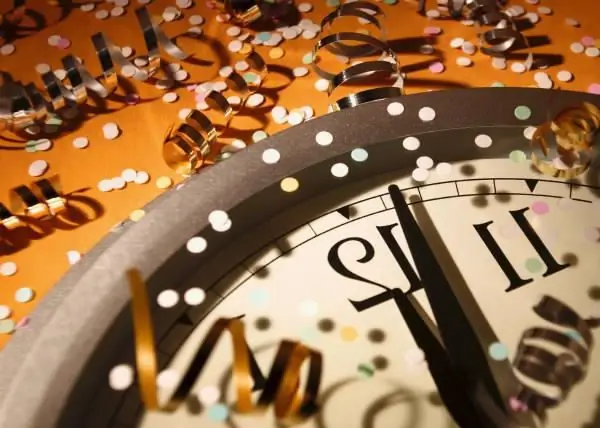
The tradition of celebrating the New Year originated five thousand years ago in Ancient Mesopotamia. It was celebrated on the days of the spring equinox, before the start of agricultural work, and was associated with the arrival of water in the Tigris and Euphrates. Gradually, this tradition spread among neighboring peoples, acquiring specific customs, characters and signs. How is the New Year celebrated in different countries today?
Celebration of the New Year: history and traditions. New Year Celebration Ideas
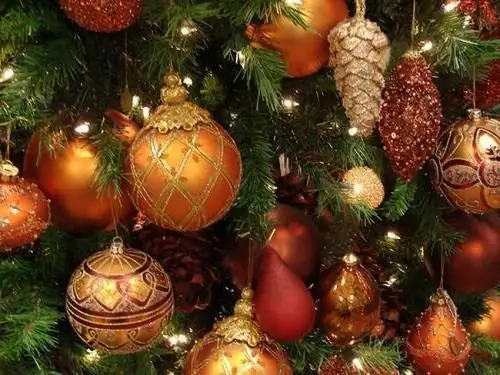
Preparing for the New Year can be done in different ways. Some of us love a quiet family holiday with Russian salad and a Christmas tree decorated with antique toys. Others go to celebrate the New Year in another country. Still others gather a huge company and arrange a noisy celebration. After all, a magical night happens only once a year
Old and new wedding traditions and rituals

Today in our country at the wedding there are various wedding traditions and rituals. But not everyone knows what most of them mean, but they are simply performed mechanically, because “it’s necessary,” the toastmaster said so. Many will be interested to know what lies at the root of a particular tradition. This information can be found in the article
History of New Year's toys in Russia. The history of the emergence of New Year's toys for children
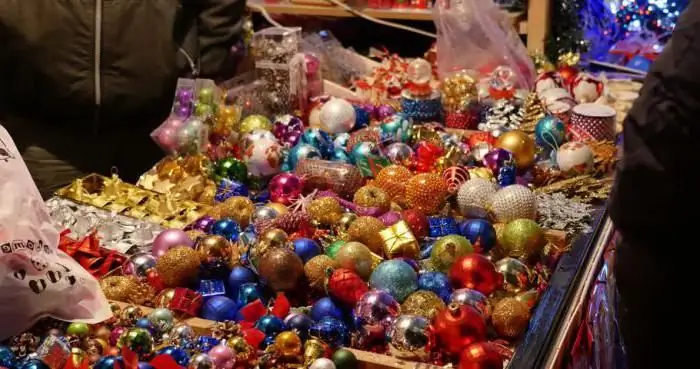
Christmas toy has long become an integral attribute of one of the main holidays of the year. Many houses have magic boxes with bright decorations, which we carefully store and take out once a year to create a long-awaited fairy-tale atmosphere. But few of us thought about where the tradition of decorating a fluffy Christmas tree came from and what is the history of the origin of the Christmas tree toy
New Year at school. New Year's events. How to decorate the school for the New Year
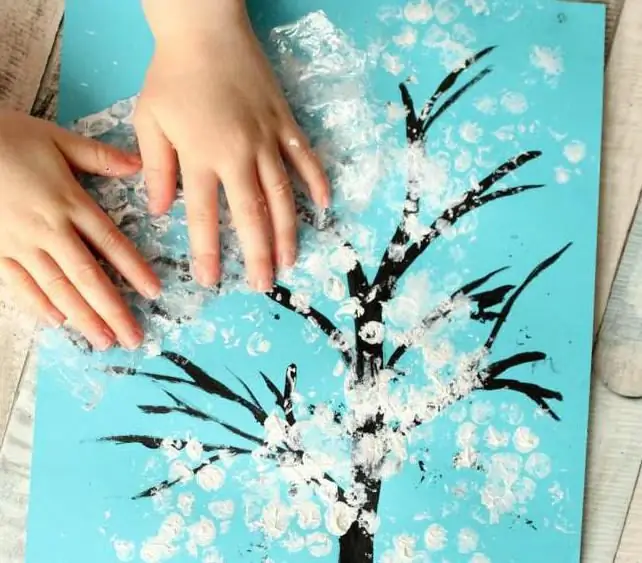
New Year at school is an interesting solemn event, for which you definitely need to prepare for the celebration to be held at the highest level

